SA Global Sumud Flotilla activists detained by Israeli forces
The SA Global Sumud Flotilla activists detained by Israeli forces have described their ordeal as deeply humiliating and unlawful. Six South Africans were among hundreds of international activists deported from Israel after being captured in international waters while en route to Gaza. Dozens of other participants remain in Israeli detention, with reports of hunger strikes and harsh conditions.
Emotional return home for South African activists
On Wednesday, 8 October 2025, a large crowd of supporters gathered at OR Tambo International Airport to welcome home six South African activists — Reaaz Moola, Zukiswa Wanner, Dr Fatima Hendricks, Zaheera Soomar, Carrie Shelver, and Nelson Mandela’s grandson, Mandla Mandela.
They were released from Israeli detention and arrived home from Qatar and Jordan after a harrowing experience aboard the Global Sumud Flotilla, which was intercepted in international waters by Israeli forces. The flotilla, consisting of 41 vessels and over 500 activists from 45 nations, was attempting to deliver humanitarian aid to Gaza and challenge Israel’s ongoing blockade — a key part of the Gaza humanitarian crisis.
‘Humiliation and dehumanisation’ during detention
Speaking at a press conference, Mandla Mandela recounted the “humiliation” experienced by the group.
“When we were intercepted, our hands were tightly handcuffed with cable ties, and our heads were pushed down,” he said.
Mandela revealed that Israeli Security Minister Itamar Ben Gvir had attempted to use the incident as a political opportunity by requesting to address him personally — but was refused by his own officers.
“He wanted to dehumanise us,” Mandela said, describing how the activists were denied basic rights such as access to showers and legal representation.
The South African activists believed they were targeted for their nation’s decision to hold Israel accountable before the International Court of Justice (ICJ).
Inside Israeli detention facilities
Dr Fatima Hendricks described the detention conditions as “inhumane,” alleging that the activists were subjected to threats, intimidation, and violence.
“They came into our cells and attacked two women. At one point, 35 soldiers pointed guns at our foreheads to remove two of our comrades,” she stated.
Author and activist Zukiswa Wanner added that the detainees were isolated from diplomatic help since South Africa has no embassy in Israel — only a representative office in Ramallah.
“The consular officials tried to see us on Thursday but were denied access. When they finally did on Sunday, we only had a few minutes to speak,” she said.
Despite these experiences, activist Zaheera Soomar said none of them regretted their actions.
“It was a difficult journey, but nothing compares to what the people of Gaza endure every day. Even in our hardest moments, we were where we wanted to be.”
International backlash and legal implications
The Global Sumud Flotilla incident has sparked global outrage and renewed debate over Israel’s actions in international waters. According to the UN Convention on the Law of the Sea, a nation’s sovereignty extends only 12 nautical miles (19km) from its coast — meaning that the flotilla’s interception occurred illegally.
Human rights organisations have accused Israel of violating international law by detaining humanitarian workers and confiscating aid destined for Gaza. The Gaza humanitarian crisis has worsened under the ongoing blockade, with millions facing shortages of food, medical supplies, and fuel.
Human Rights Watch maintains that Israel’s control over Gaza remains intact despite withdrawing ground forces in 2005.
“Israel still controls Gaza’s airspace, territorial waters, and movement of goods and people,” the organisation stated, “making it an open-air prison.”
South African response and global solidarity
South Africa’s Department of International Relations and Cooperation (DIRCO) expressed concern over the activists’ detention, reaffirming the country’s commitment to international humanitarian law.
Higher Education Minister Buti Manamela also commended the activists for their courage and reiterated that South Africa stands in solidarity with Palestine.
Analysts have said that Israel’s actions may strain diplomatic relations further, especially given South Africa’s ongoing case at the ICJ accusing Israel of genocide in Gaza.
A symbolic act of resistance
The SA Global Sumud Flotilla activists detained by Israeli forces have become symbols of resistance against oppression. Their journey aimed to challenge not only Israel’s blockade but also the global silence surrounding the Gaza humanitarian crisis.
Human rights lawyer Reaaz Moola said the flotilla’s mission was never about confrontation but compassion.
“We wanted to remind the world that humanity must not be selective. Gaza deserves dignity, freedom, and the right to live,” Moola said.
The flotilla’s mission has inspired similar campaigns worldwide, with human rights groups calling for renewed efforts to end the siege on Gaza and provide unhindered humanitarian access.
Looking ahead
As the activists settle back home, international calls for accountability are mounting.
Several human rights organisations, including Amnesty International and the International Federation for Human Rights (FIDH), are demanding an investigation into Israel’s actions during the interception.
Legal experts argue that the Global Sumud Flotilla incident adds weight to South Africa’s ICJ case and highlights the urgency of addressing the humanitarian catastrophe in Gaza.
Conclusion
The SA Global Sumud Flotilla activists detained by Israeli forces endured humiliation and hardship but remain steadfast in their mission to expose injustice. Their story underscores the broader reality of the Gaza humanitarian crisis and the human cost of political conflict.
Despite suffering in Israeli detention, these South African activists have reignited international attention toward Gaza’s plight — proving that solidarity can transcend borders and that even small acts of courage can challenge the world’s most powerful systems.








